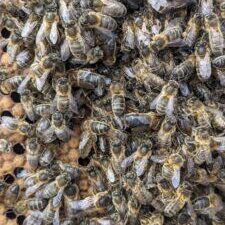There are many reasons why we may want to keep bees. Some of the more obvious reasons include: producing your own honey, an interest in social insects, flower pollination, business reasons, the challenge of doing it or to help protect the environment. Whatever your reason, there are a number of important things you need to consider before you get any bees.
It is safe to say that beekeepers have their ups and downs. Keeping bees is normally very rewarding -

So what should anyone thinking of keeping bees consider?
Time
Keeping bees requires your time and commitment. There are times in the year when you will only need to visit your bees occasionally (e.g. during the winter to check they have enough food and that they haven’t blown over), while at other times you may have to visit your bees weekly (to prevent or manage swarming). Doing things at the right time makes a good beekeeper.
Money
The equipment needed to start up in beekeeping can be expensive. You will need bees, a hive, frames, foundation, protective clothing, tools (see equipment) and ultimately, honey production equipment. Brand new, these all cost quite a lot but you can pick up used equipment at Association sales, second quality equipment from Thornes or even from Ebay. For those with wood working skills, costs can be kept down by making hive parts. The Association will provide support and advice on buying bees and equipment and other members may have equipment to sell or share. Once you have built up a critical mass of equipment, you will have overcome that initial investment and can keep things ticking over.
Location
Can you find an appropriate location for the number of hives you wish to keep? You will always need to be prepared to locate more hives than you originally intended (especially when you start to divide hives or catch swarms). Nice, placid bees may sit comfortably in your garden, but don’t rely on your bees always being placid. Also, don’t rely on your neighbours liking the idea of living so close to bees when they find out you have some just over the fence. You should also keep bees away from areas where people walk or where children play. Guard bees can notice movement up to around 8-
Confidence
For many, the idea of being covered in angry bees is not a pleasant one. Of course most beekeepers manage their colonies and breed out such bad traits (or try to), but even for the best of us it can be pretty daunting when faced with aggressive bees -
Allergy
If you know you suffer any kind of serious allergic response to bee stings, then beekeeping is probably not for you. None of us like being stung and most of us take precautions to avoid being stung. After receiving a number of stings, people tend to develop some degree of allergic response (some more noticeable than others). This is quite natural. But occasionally an allergic response can lead to a more severe reaction that can be life threatening (see Bee Stings).
